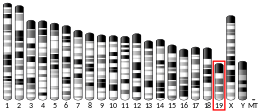DAK (gene)
Triokinase/FMN cyclase is an enzyme that in humans is encoded by the DAK gene.[5]
Function[]
This gene is a member of the family of dihydroxyacetone kinases, which have a protein structure distinct from other kinases. The product of this gene phosphorylates dihydroxyacetone, and also catalyzes the formation of riboflavin 4',5'-phosphate (aka cyclic FMN) from FAD. Several alternatively spliced transcript variants have been identified, but the full-length nature of only one has been determined.[5]
References[]
- ^ a b c GRCh38: Ensembl release 89: ENSG00000149476 - Ensembl, May 2017
- ^ a b c GRCm38: Ensembl release 89: ENSMUSG00000034371 - Ensembl, May 2017
- ^ "Human PubMed Reference:". National Center for Biotechnology Information, U.S. National Library of Medicine.
- ^ "Mouse PubMed Reference:". National Center for Biotechnology Information, U.S. National Library of Medicine.
- ^ a b "Entrez Gene: DAK dihydroxyacetone kinase 2 homolog (S. cerevisiae)".
Further reading[]
- Diao F, Li S, Tian Y, Zhang M, Xu LG, Zhang Y, Wang RP, Chen D, Zhai Z, Zhong B, Tien P, Shu HB (July 2007). "Negative regulation of MDA5- but not RIG-I-mediated innate antiviral signaling by the dihydroxyacetone kinase". Proceedings of the National Academy of Sciences of the United States of America. 104 (28): 11706–11. doi:10.1073/pnas.0700544104. PMC 1913852. PMID 17600090.
- Kimura K, Wakamatsu A, Suzuki Y, Ota T, Nishikawa T, Yamashita R, Yamamoto J, Sekine M, Tsuritani K, Wakaguri H, Ishii S, Sugiyama T, Saito K, Isono Y, Irie R, Kushida N, Yoneyama T, Otsuka R, Kanda K, Yokoi T, Kondo H, Wagatsuma M, Murakawa K, Ishida S, Ishibashi T, Takahashi-Fujii A, Tanase T, Nagai K, Kikuchi H, Nakai K, Isogai T, Sugano S (January 2006). "Diversification of transcriptional modulation: large-scale identification and characterization of putative alternative promoters of human genes". Genome Research. 16 (1): 55–65. doi:10.1101/gr.4039406. PMC 1356129. PMID 16344560.
- Cabezas A, Costas MJ, Pinto RM, Couto A, Cameselle JC (December 2005). "Identification of human and rat FAD-AMP lyase (cyclic FMN forming) as ATP-dependent dihydroxyacetone kinases". Biochemical and Biophysical Research Communications. 338 (4): 1682–9. doi:10.1016/j.bbrc.2005.10.142. PMID 16289032.
- Cheek S, Ginalski K, Zhang H, Grishin NV (2006). "A comprehensive update of the sequence and structure classification of kinases". BMC Structural Biology. 5: 6. doi:10.1186/1472-6807-5-6. PMC 1079889. PMID 15771780.
- Cabezas A, Pinto RM, Fraiz F, Canales J, González-Santiago S, Cameselle JC (November 2001). "Purification, characterization, and substrate and inhibitor structure-activity studies of rat liver FAD-AMP lyase (cyclizing): preference for FAD and specificity for splitting ribonucleoside diphosphate-X into ribonucleotide and a five-atom cyclic phosphodiester of X, either a monocyclic compound or a cis-bicyclic phosphodiester-pyranose fusion". Biochemistry. 40 (45): 13710–22. doi:10.1021/bi0157159. PMID 11695920.
- Suzuki Y, Yoshitomo-Nakagawa K, Maruyama K, Suyama A, Sugano S (October 1997). "Construction and characterization of a full length-enriched and a 5'-end-enriched cDNA library". Gene. 200 (1–2): 149–56. doi:10.1016/S0378-1119(97)00411-3. PMID 9373149.
- Maruyama K, Sugano S (January 1994). "Oligo-capping: a simple method to replace the cap structure of eukaryotic mRNAs with oligoribonucleotides". Gene. 138 (1–2): 171–4. doi:10.1016/0378-1119(94)90802-8. PMID 8125298.
Categories:
- Genes on human chromosome 11
- Human chromosome 11 gene stubs




